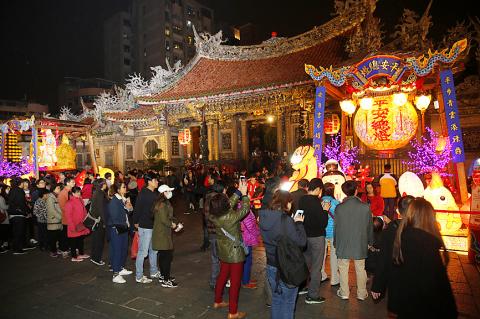Beijing yesterday announced that starting today it is suspending a program that allowed individual tourists from 47 Chinese cities to travel to Taiwan, citing the current state of relations between the two sides.
Chinese nationals may only travel to Taiwan as tourists if they are part of tour groups, the Chinese Ministry of Culture and Tourism said in a statement.
The ministry’s statement did not provide any further details as to the reason for the ban.

Photo: CNA
The unexpected move comes as China attempts to isolate Taiwan and President Tsai Ing-wen’s (蔡英文) administration.
Travel to Taiwan was opened to Chinese nationals in 2011, during former president Ma Ying-jeou’s (馬英九) administration.
The move might also be aimed at hurting Tsai’s re-election chances in the presidential election on Jan. 11 next year.
Chinese Ministry of Foreign Affairs spokeswoman Hua Chunying (華春瑩) declined to answer a question about the decision, asking reporters at a briefing in Beijing yesterday afternoon to talk to the relevant department for Taiwan affairs.
The Mainland Affairs Council issued a statement condemning the move, saying that cross-strait tourism is an important way of promoting better understanding.
It called on Beijing to discuss the issue with Taipei.
The Tourism Bureau said it regretted Beijing’s decision and hoped for a return to positive interaction with China.
“This is a shock to all of us. We are all very worried about it,” Taipei Association of Travel Agents chairman Benny Wu (吳志健) said by telephone. “This will have a huge impact on Taiwan’s tourism [industry] and economy.”
Spending by foreign tourists accounted for about 2.2 percent of GDP in 2017, the last year for which data is available, according to the bureau.
China was the largest single source of people visiting Taiwan and accounted for almost one-third of total visitors to the nation in May, according to a Bloomberg calculation based on data published by the bureau.
“As Taiwan is holding a presidential election soon, it’s not surprising that China is banning its citizens from visiting Taiwan,” KGI Securities Investment Advisory Co (凱基投顧) chairman Chu Yen-min (朱晏民) said.
“It seems to be a routine practice ahead of elections, as China doesn’t want its citizens to witness democracy,” Chu added. “The ban is expected to have a limited impact on Taiwan’s economy and stock market, as those hit are mostly not listed companies.”

Right-wing political scientist Laura Fernandez on Sunday won Costa Rica’s presidential election by a landslide, after promising to crack down on rising violence linked to the cocaine trade. Fernandez’s nearest rival, economist Alvaro Ramos, conceded defeat as results showed the ruling party far exceeding the threshold of 40 percent needed to avoid a runoff. With 94 percent of polling stations counted, the political heir of outgoing Costa Rican President Rodrigo Chaves had captured 48.3 percent of the vote compared with Ramos’ 33.4 percent, the Supreme Electoral Tribunal said. As soon as the first results were announced, members of Fernandez’s Sovereign People’s Party

MORE RESPONSIBILITY: Draftees would be expected to fight alongside professional soldiers, likely requiring the transformation of some training brigades into combat units The armed forces are to start incorporating new conscripts into combined arms brigades this year to enhance combat readiness, the Executive Yuan’s latest policy report said. The new policy would affect Taiwanese men entering the military for their compulsory service, which was extended to one year under reforms by then-president Tsai Ing-wen (蔡英文) in 2022. The conscripts would be trained to operate machine guns, uncrewed aerial vehicles, anti-tank guided missile launchers and Stinger air defense systems, the report said, adding that the basic training would be lengthened to eight weeks. After basic training, conscripts would be sorted into infantry battalions that would take

GROWING AMBITIONS: The scale and tempo of the operations show that the Strait has become the core theater for China to expand its security interests, the report said Chinese military aircraft incursions around Taiwan have surged nearly 15-fold over the past five years, according to a report released yesterday by the Democratic Progressive Party’s (DPP) Department of China Affairs. Sorties in the Taiwan Strait were previously irregular, totaling 380 in 2020, but have since evolved into routine operations, the report showed. “This demonstrates that the Taiwan Strait has become both the starting point and testing ground for Beijing’s expansionist ambitions,” it said. Driven by military expansionism, China is systematically pursuing actions aimed at altering the regional “status quo,” the department said, adding that Taiwan represents the most critical link in China’s

‘REALLY PROUD’: Nvidia would not be possible without Taiwan, Huang said, adding that TSMC would be increasing its capacity by 100 percent Nvidia Corp CEO Jensen Huang (黃仁勳) on Saturday praised and lightly cajoled his major Taiwanese suppliers to produce more to help power strong demand for artificial intelligence (AI), capping a visit to the country of his birth, where he has been mobbed by adoring fans at every step. Speaking at an impromptu press conference in the rain outside a Taipei restaurant, where he had hosted suppliers for a “trillion-dollar dinner,” named after the market capitalization of those firms attending, Huang said this would be another good year for business. “TSMC needs to work very hard this year because I need a lot